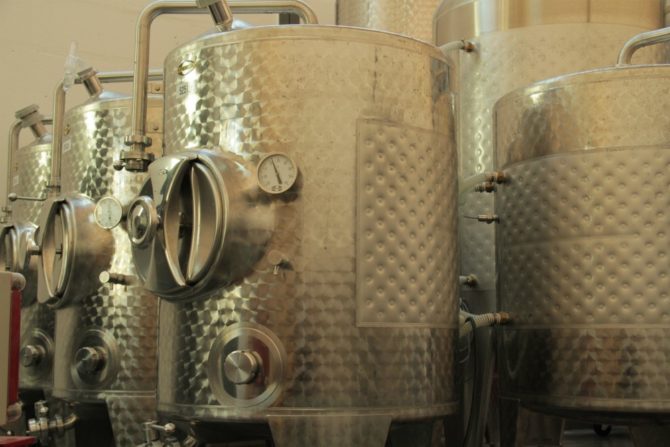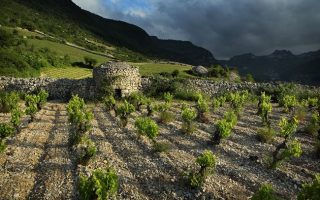Deck & Donohue Brewery in Montreuil

The story of Montreuil is elegantly told in two statues standing outside the city hall: la Jardinière represents five centuries of agriculture, and le Fondeur, an ardent half-century of industry. Until the dismal economic climate of the 1970s settled over France, leather, wood, spirits, and even pianos and wall paper, were all manufactured in this Parisian suburb, whose orchards once supplied the king with peaches. Today, Montreuil’s industrial heritage is being revived and reinvented in exciting ways. On the aptly named rue de la Fraternité, brewers Thomas Deck and Mike Donohue are rolling up their sleeves and brewing beer next to a carpenter and a soap maker, in a bright, open space that was still being renovated when I stopped by on a Saturday morning in April.
“Watch out it’s slippery,” says Mike, as he comes down a set of stairs at the back of the brewery. Deck & Donohue opened just over a month ago, and everything is still gleaming, from the freshly washed tile I walk gingerly across to greet Mike, to the cluster of fermenters sitting snugly behind a set of taps.
“Welcome to the brewery!” It’s still early on Saturday and I’m one of the first to show up during open house hours. We take advantage of the relative calm to talk about how Mike ended up making beer in France, the many exciting possibilities for recycling spent grain and what kind of beer he and Thomas like to drink.
Mike and Thomas—American and Alsatian, respectively—have been friends since they met at Georgetown over ten years ago. Many beers savored and miles travelled later (sometimes to savor said beer together), they decided it was time: “At some point when you’ve shared that many beers with someone, you think, hey, maybe we should just start a brewery,” says Mike.
I resist the urge to start tasting beer right away and we start the tour upstairs. “Here’s the mill room.” Mike opens a door onto a sweet-smelling closet where a malt-dusted mill marks the beginning of the brewing process. Finished test batches stand in neat rows next to bags of barley and rye. “That’s the box from Agnès,” says Mike, pointing at a basket of fresh vegetables balanced on a stack of malt sacks, a bit of dirt still clinging to the leek roots. Agnès is an agro-forestry researcher based outside of Claye-Souilly in Seine-et-Marne who has a solution for Deck & Donohue’s spent grains: “It either goes to feed her animals or into the compost; either way, it doesn’t go to waste,” explains Mike.
That resonates with the pair’s desire to be a local brewery, but not a brewery defined by its location. “It didn’t make sense for us to be named after a place,” says Mike, when I ask how they settled on a name. “We could be making beer anywhere. What’s important to us is quality and putting our name on our beer is a way to hold ourselves to that.”As Mike points out, a brewery in France is only about 300 kilometers from all of its ingredients if it chooses to be so. It’s a unique situation not found often in the United States and one the brewers hope to take advantage of by using new European hop varieties and French grain.
Downstairs, the brewery is the picture of small-scale efficiency. It’s a simple set up, but compact and state-of-the-art: A 500-liter mobile Braumeister shares space with five fermenters and a brite tank, as well as the bottling machine and taps for tasting. As I hover around their labeling machine taking pictures, I tell Mike that the design reminds me of an old woodblock print, but more modern. He smiles. “That’s kind of what we’re after. We think there’s something unique to be found at the intersection of simple tradition and modernity.”
It’s not a bad tack to take in France, where beer culture is still maturing. Young breweries like Deck & Donohue are arriving just in time: a larger slice of the French public—not just the beer geeks—has begun to consider beer respectable, thanks to the increased availability of foreign imports, the growth of domestic micro-breweries and the appearance of specialty bottle shops and bars across the country. If the first Paris craft beer festival scheduled for the end of May is any proof, France is ready to take its place among the countries leading the craft beer revolution.
“Until recently, French breweries weren’t necessarily overly concerned about creativity. But now they’re really finding their own styles and experimenting. It’s getting interesting,” says Thomas, between answering questions from neighbors who’ve come to see what’s going on around the corner.
Deck & Donohue want to make simple beers founded on classic styles, which means they’re more about subtle complexity than hit-you-over-the-head hoppy or extreme flavors. “As a new brewery, people expect you to make the next crazy thing—triple aged, sour, some new yeast strain, anything. But we’re not interested in that. We’re trying to make clean, balanced, dry beers that are drinkable—that we want to drink,” says Mike. “People do still like that kind of beer.”
Simple and drinkable doesn’t mean boring, however. “An intentionally small-scale production gives us enormous control over quality and the freedom to experiment a little without taking big risks,” explains Mike. Once they’re comfortable with the 5-beer core line-up, they’ll add seasonal beer and one-offs. But one thing at a time; at the moment they’re scrambling to keep their beer in stock. On this particular Saturday, they’re out of Trouble #6 and Mission Pale Ale for purchase at the brewery. “Maybe it’s the novelty, but it’s good,” says Mike. “Now we’re just trying to get some more beer made.”
Saturday is open house and curious neighbors begin to trickle in around 11:30 a.m. “I read about the brewery in the Montreuil paper and thought I’d come visit,” says one older man, bike helmet in hand. He turns out to be a chemist and soon Thomas has a pile of dried hops on the table for him to smell. “My partner’s kind of obsessed with beer,” says a British woman. They’ve come together to stock up. “You have to look hard to find good beer around here,” says another neighbor, stroller in tow. “This is a really cool place to have!”
Eventually the Parisians start arriving and by 2:30 p.m. the 120-square-metre brewery is bustling with activity and resonating with laughter. Mike and Thomas pull half pints for tasting, giving a little back story on each beer: the Mission Pale Ale is named for the street in San Francisco where Mike and Thomas first brewed together and the smoothness of the Monk brown ale comes from the addition of oats. At some point the smell of grilled meat drifts in when Mike brings in a plate of skewers donated by the construction workers on their lunch break. “They stop in too,” he says, setting down a line of chicken and vegetables.
It’s hard to pull myself away when other duties call, and not only because I’ve sampled all four beers currently on tap. No; it’s the conversations carrying on to the burbling of airlocks, the sun glinting on polished metal and that comforting malty sweetness underlining it all that makes it hard to say no to another glass of Monk brown ale and pedal back to Paris.
Deck & Donohue doesn’t have a license to sell beer on tap, but bottles are available for purchase during open house hours, every Saturday from 10 a.m. to 3 p.m. See their website for more details, and keep an eye on their Facebook page.
Unabashedly gourmande, Kate Robinson can regularly be found sleuthing out the best watering holes, secret gardens and food joints in Paris. Follow Kate on Twitter: @KateOnTheLoose
Share to: Facebook Twitter LinkedIn Email
Leave a reply
Your email address will not be published. Required fields are marked *




REPLY